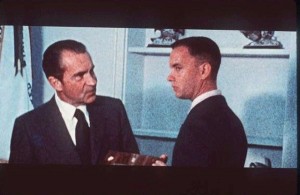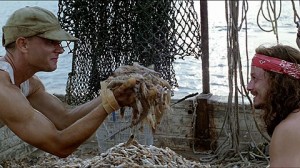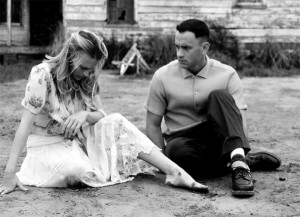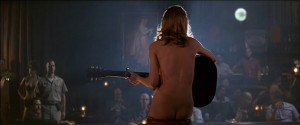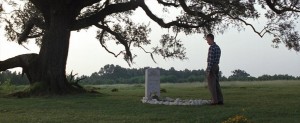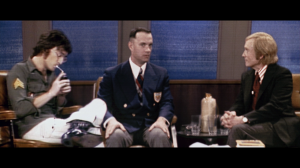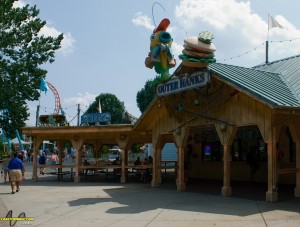100 Film Favorites – #19: Forrest Gump
(Robert Zemeckis, 1994)
“I don’t know if we each have a destiny, or if we’re all just floating around accidental-like on a breeze…but I think maybe it’s both.”
I just realized that Robert Zemeckis has a really good track record on this Countdown. I may have to do a director tally at the end and see if Zemeckis edges out Spielberg.
Forrest Gump is one of the most widely-referenced films of recent decades, so there’s a good chance you’re at least familiar with it. Based on Winston Groom’s 1986 novel of the same title, the film is essentially a biopic of fictional character Forrest Gump, a southern man with a low IQ, as he lives through the second half of the twentieth century, frequently becoming involved (often obliviously) in major historical events. Forrest (Tom Hanks) tells the story himself, seated at a bus-stop bench and regaling the people who sit down beside him.
Gump’s journey begins when, fleeing bullies as a young boy, he discovers an ability to “run like the wind blows,” both fast and far. His remarkable running makes him an excellent football player, and Forrest lands a spot on the All-America Team, even traveling to the White House to meet President Kennedy.
Later, he joins the Army, where he excels due to his ability to follow orders and his lack of fear in dangerous situations. He is deployed to Vietnam, and receives the Medal of Honor after he saves much of his platoon from a firefight. For his heroism, he is officially commended by President Lyndon Johnson. While recuperating from his own injuries, Forrest discovers another talent: Ping-pong playing. Practicing constantly, he spends the rest of his time in the service as a star member of the Army ping-pong team, even touring China as part of Nixon’s “ping-pong diplomacy.” “I went to the White House…again,” he recalls, sounding bored. “I met the President of the United States…again.”
After his service, Forrest purchases a shrimping boat to fulfill the dream of Bubba, his “best good friend,” who died in the firefight in Vietnam. Forrest’s former commanding officer Lieutenant Dan, now an embittered amputee who resents Gump for saving his life, signs on as first mate, bemused at Forrest’s optimism and skeptical as to their business prospects. However, Lieutenant Dan finds faith and a renewed zeal for life when a freak storm destroys all the other shrimping boats on the bayou. Dan and Forrest rake in the sea’s bounty uncontested, and soon the “Bubba-Gump Shrimp Company” is doing booming business, with a whole fleet of ships to its name. When Dan decides to invest in “some fruit company” (the fledgling Apple, Inc.) in the late 70s, Gump’s wealth skyrockets further.
Forrest’s life story is interwoven with that of Jenny Curran, a childhood friend whom he has long loved. Jenny was abused as a child and she leads a troubled life, in stark contrast to Forrest’s seemingly charmed existence. She becomes involved in the Hippie movement and other counterculture groups, engaging in frequent drug use and other assorted debauchery. Jenny pops in and out of Forrest’s life intermittently, and at one point he proposes to her, stating “I may not be a smart man, but I know what love is.” Though she turns down the proposal, they make love before Jenny disappears once again.
Her departure inspires Forrest to “go for a run.” In one of the most impactful sequences I personally have ever seen, Gump decides to keep going when he reaches the edge of town, the county line, the state line, and the East Coast. Turning around, he proceeds to run all the way to the West Coast. He runs across the country, back and forth, for nearly three years. Ever since I first saw this scene, it has been my ambition to one day complete a coast-to-coast trip on foot. As some of you may know, I made a less-than-impressive attempt last summer, traveling 75 miles inland from Virginia Beach over the course of four days. My failure wasn’t for lack of equipment. Rather, the tires popped on the cart I was pushing, I discovered I was covered with ticks, and the police confronted me for trespassing on private land. I am currently revising a strategy for a more successful attempt (lightening my load to obviate the need for the cart, starting at the end of winter to pass through tick-heavy areas while it’s still relatively cold, and mapping a more detailed route before departing to minimize trespassing). Provided I can earn the money to pay for (legitimate) camping and lodging by then, I’m prospectively scheduling my next attempt to begin March 1st, 2014. You heard it here first.
The film ignores the logistics of Forrest’s run, with Gump simply saying he “ate when he was hungry” and “slept when he was tired.” Over the course of his travels, he gradually attracts a crowd of fellow runners in search of meaning or spiritual epiphanies. These pilgrims hang on Forrest’s few utterances (some of which inspire modern adages, such as “shit happens”), and assume his run is motivated by some profound mission, though he repeatedly asserts that he “just feels like running.” After three years, and sporting a beard to rival the one Tom Hanks would later wear in Cast Away, Gump finally comes to a stop. The assembled crowd wait with baited breath to hear his “message.” “I’m pretty tired,” he says. “I think I’ll go home.” He promptly does so, leaving the expectant crowd of soul-searchers in the dust.
Jenny eventually returns with a young son, Forrest, “named after his daddy.” She and the older Forrest finally wed, but Jenny soon succumbs to a mysterious illness (heavily implied to be AIDS). Forrest concludes his story, as he has reached the present moment. We discover Gump has spent the day waiting at the bus stop for “Little Forrest” to return from school. As the bus arrives, a feather which had alit on the bench at the start of the film takes to the air once more, floating along on the whims of the breeze.
As with Napoleon Dynamite, I’ve encountered people who vehemently dislike this movie. I believe most of the disdain stems from two issues: First, that Gump is a mentally disabled character played (ergo, misrepresented) by an “able” actor, and second, that the film seems to prize conservative values while condemning liberal or progressive views.
With regard to the first point, I would suggest that, rather than “retarded” or even “stupid,” Forrest’s primary characteristic is that he is oblivious to or simply unaffected by much that goes on around him. He IS the feather – “blown” here and there by the “winds of chance.” It’s the same situation depicted in Being There, but done here with a more optimistic view. While Chance’s tale is calculated to condemn the shallow way in which modern Americans appraise our leaders, Gump’s oblivious nature serves a different purpose. In a sense, Forrest’s “blankness” allows him to serve as a true everyman, a template for every American’s experience of the decades through which he lived. Rather than a biopic of a single real person, the film is a biopic of America itself in the late 20th century. Like Forrest, the American people drifted through a string a monumental events, often without understanding their personal significance or role within those events. But even though we may not understand our role, individuals can, and do, continue to do great things. The question of whether those things are the result of the individual’s striving to achieve a destiny, or simply of chaotic guiding forces like the blowing of the wind, is still “up in the air.”
As for the second point, a conservative agenda is fairly apparent. In a sense, Forrest is rewarded for being a “momma’s boy” and for “doing what he’s told.” He’s at least somewhat religious, and during the Vietnam war, he serves in the military. Jenny, on the other hand, engages in countercultural behavior associated with “the left,” and suffers as a result. Over the course of the film, she falls victim to sexual harassment and drug addiction, and ultimately succumbs to AIDS. Some have even attributed the success of the Republican Party and their “Contract with America” in the 1994 Congressional Election to the film’s championing of conservative values.
Whether or not the filmmakers intended to push a political agenda, Jenny has a greater significance than merely as a symbol of the perils of liberal “looseness.” I think she can also be seen as a feather. Like Forrest, her life is shaped by forces beyond her control. Though she tries to take an active role in changing the world around her, she is ultimately unable to significantly influence the trajectory her life follows. The film seems to suggest that much of life is random, so our best bet is to stand by those we love, come what may.
In addition to Best Picture, Forrest Gump won Oscars for Best Actor (Tom Hanks, his second consecutive win after 1993’s Philadelphia), Best Director, Best Editing, and Best Visual Effects (for the many sequences in which Hanks as Gump is edited into real historical footage and seems to actually be interacting with the assorted famous figures, including Kennedy, Johnson, and John Lennon). It’s a finely-crafted film featuring countless memorable lines, iconic visuals, and an unforgettable theme by Alan Silvestri which channels the floating quality of the symbolic feather. Regardless of your political leanings, Forrest Gump has earned a place of prominence in the history of cinema.
-Tidbit: The fictional Bubba Gump shrimp company inspired a real chain of restaurants, which began opening shortly after the film’s release. Bubba Gump restaurants still operate in vacation destinations across the country, showing the film on loop in the lobby. There was even one at King’s Dominion…until recently. Sorry to rustle the jimmies of anyone who may not have visited the park in the past few years, but King’s Dominion was purchased relatively recently by the same company which owns Cedar Point, and as such the park had to drop its Paramount theme. This meant that all attractions within the park that referenced Paramount properties had to be modified. However, many of the new attraction names alluded to what they once were. The new name of the Bubba Gump restaurant?
“The Outer Hanks.”
—
Brian Terrill is the host of television show Count Gauntly’s Horrors from the Public Domain. You can keep up with Brian’s 100 Film Favorites countdown here.




